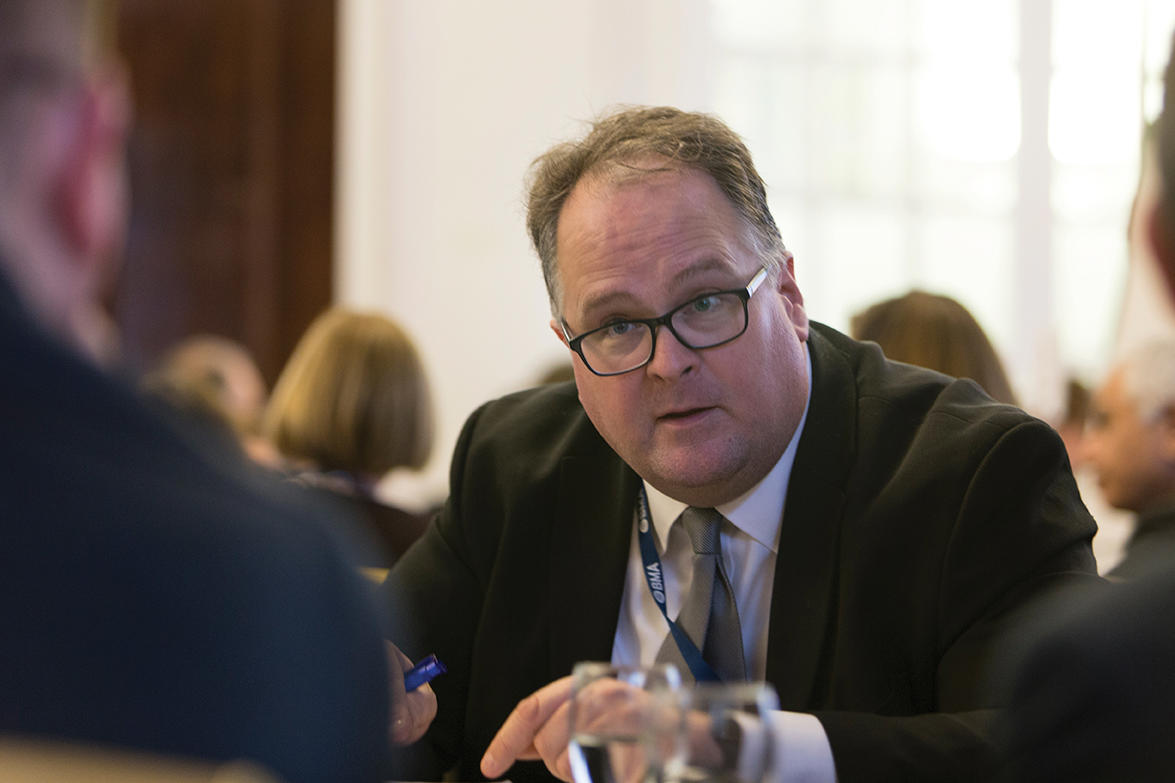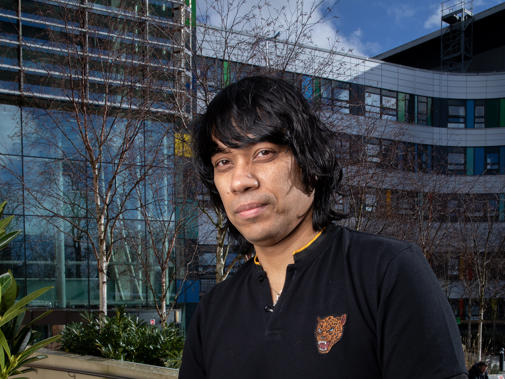‘It’s a case of holding our breath and seeing what comes.’
The future worries Portsmouth diabetes consultant Partha Kar (pictured).
Across the health service doctors are anticipating being hit by an avalanche of unmet need as the health service begins to shift from a near total focus on COVID-19 to facing the conditions patients have kept to themselves or doctors have tried to manage in the community.
BMA analysis suggests that between April and December 2020 there were 2.7 million fewer elective procedures and 18.66 million fewer outpatient attendances. And the number of patients waiting for over one year for treatment has now risen to 153-fold its 2019 value – consistently rising since the early days of the pandemic in March 2020.
This is going to be a huge legacy trying to pick these people upDr Kar
For Professor Kar, the overwhelming sense of uncertainty – ahead of the mountainous, but recorded, waiting lists – is the greatest fear.
‘There are several areas of real worry for me. If you take away some of the checks and the ongoing management of patients with diabetes you miss out on foot issues like ulcerations that can progress to needing amputation, the second worry is people’s eyes and the issues you would pick up in screenings and this third is the impact on kidneys which needs checking on an annual basis.
‘We have good outcomes because of our clinics and because staff in primary care do an amazing job at annual check-ups and managing patients – but those things have all dropped off and that could have consequences.’
The national specialty adviser for diabetes to NHS England adds: ‘There are patients understandably worried about end organ damage affecting their eyes, feet or kidneys for example. And ultimately these could be the impacts of these last 12 months. And the added concern is that if we pick up a mountain of these issues you will always only have the finite funding of the NHS to deal with that pressure.
'Throw in the lack of any time for recovery and professionals are worried about the possibility of all that work coming our way and, ultimately, what that means for the health of our patients.
‘It’s a very tricky position and it’s a case of holding our breath, seeing what comes, and also trying to pre-empt that too.’
Admissions down
It is a worrying future for doctors from a wide range of specialties.
Consultant cardiologist Charlotte Manisty says: ‘There are obviously huge signs of long-lasting impacts on healthcare, particularly in areas like cancer and cardiology, where I work.
'We know hospital admissions for heart attacks went down by a third in the first wave and admissions for heart failure went down by a half. Those aren’t people not having heart attacks or heart failure, they are people not coming to hospital. This is going to be a huge legacy trying to pick these people up and will need extensive input.’
We are going to see deaths and complications as a resultDr Farzana
East London GP Farzana Hussein has seen the cases in the community which provide the context for the fall in demand that Dr Manisty outlines.
She says: ‘Just last week I had two people with chest pains that sounded like heart attacks and I had to tell them not to wait for me to phone them. But they were worried about getting to hospital and getting COVID. And they’d heard the hospitals were overrun.
‘People are not going to hospital. But I can’t manage a heart attack. I’m not a rural Scottish GP with the skills to thrombolyse. I’m seeing a lot of this and we are going to see deaths and complications as a result.’
 MANISTY: ‘Hospital admissions for heart attacks went down by a third’
MANISTY: ‘Hospital admissions for heart attacks went down by a third’
Dr Manisty adds: ‘It all just feels like a big unknown. All the balls have been thrown up in the air but where they and we don’t know yet. We know there’s all this disease out there – but we aren’t seeing it. The worry is that there are people out there not receiving the care and the follow up they are entitled to and should have in order to improve their clinical outcomes. But nobody knows quite what is to be expected.’
These are likely to be problems faced across the country in every area. The BMA’s latest tracker survey – which is responded to by thousands of doctors – revealed that urgent non-COVID care, such as cancer, had been delayed in around half of members’ workplaces. And eight in 10 doctors reported delays or cancellations for non-urgent routine care.
Huge waiting lists
Every month the NHS’s performance statistics become more stark – with this second or third wave of the pandemic seeming to have an incredibly long and relentless tail.
The number of patients waiting more than one year for treatment is a 12-year high, the waiting list now stands at 4.52 million and there are large numbers of patients still waiting to be referred on to the waiting list – with the published figures likely to only skim the surface of the actual volume of unmet care.
 WRIGLEY: ‘We need to look at how to tackle this huge backlog and mountain of work for patients’
WRIGLEY: ‘We need to look at how to tackle this huge backlog and mountain of work for patients’
‘A lot of this will come to fruition in the coming year,’ BMA council deputy chair David Wrigley says.
The north-west GP adds: ‘We had huge waiting lists prior to this pandemic, we were woefully under-doctored and very low on hospital beds and nurses for our population.
Going into a pandemic with no slack and with the healthcare system under immense pressure was always going to be a problem. It meant all that routine – and some emergency work – has had to be put aside.’
Going into a pandemic with no slack was always going to be a problemDr Wrigley
It is hard for patients and doctors to see this growing unmet need, Dr Wrigley says. ‘We are seeing patients who are really struggling and don’t have an idea when their follow-up will be. I saw a patient the other day who needs another injection into his spine for his crippling back pain but there’s no sign of that happening. It is hard as a doctor when there is a limit of what you can do for people. The NHS will have to try and get through this but there’s such a volume of need that heaven knows how.’
These frustrations have also been felt keenly by York GP Abbie Brooks. She says: ‘That’s been one of the most difficult things and something people don’t necessarily understand. If someone has a knee clinic or pain clinic postponed or cancelled it comes to us as our responsibility – we are holding that person as our risk, trying to get them through those painful weeks. It can impact mobility, then mental health and can have other impacts later on.’
Cut bureaucracy
There will be many questions asked and many answers required when it comes to addressing all of this vast unmet need: Will the NHS continue to use private sector support? Will the Government come up with a proper funding package to support the service working through the backlog?
The BMA estimates that the number of elective treatments missed between April and December last year alone will cost up to £5.4bn to work through. And what lessons can be learned from the last 12 months – a reduction in bureaucracy and the effects of the Care Quality Commission and GMC, for example. For Dr Wrigley these are a must: ‘It’s back to that old mantra of let doctors get on with being doctors – don’t divert them away with needless paperwork.’
We need the Government to devise a plan for how the NHS will support staffDr Nagpaul
Perhaps the biggest question of all – and one requiring the most comprehensive and creative answer – is around the well-being of the workforce though. How can exhausted doctors be expected to simply move from one crisis to another?
In last month’s issue of The Doctor Kevin Fong, a London consultant anaesthetist, who was seconded as national clinical adviser to NHS England’s emergency preparedness resilience and response team for COVID-19, described frontline staff as having suffered ‘definite injury’.
 BROOKS: ‘If someone has a clinic cancelled it comes to us as our responsibility’
BROOKS: ‘If someone has a clinic cancelled it comes to us as our responsibility’
Dr Fong, who co-authored a study published last month which found that nearly half of ICU staff are likely to meet the threshold for PTSD, severe anxiety or problem drinking during the COVID-19 pandemic, says the end of the pandemic must not mark an immediate move to tackling waiting lists and facing another crisis.
He says: ‘We need a huge programme of rest and recovery – if not reward too.’
Exhausted doctors
It is a big problem in an NHS which already has some 100,000 frontline vacancies with a mountain of patient need looming.
But, it would be a false equivalence to view these problems as either supporting staff or providing patient care – because Government ministers and health leaders cannot have the latter without providing the former.
As BMA council chair Chaand Nagpaul says: ‘Doctors are physically and emotionally exhausted, and we desperately need the Government to devise a thorough action plan for how the NHS will support and invest in staff and services to tackle the immense amount of work ahead.’
Dr Wrigley calls for a ‘taskforce’ to tackle these unprecedented issues. He says: ‘We need to look at how to tackle this huge backlog and mountain of work for patients who need care and attention but also to look after the staff who have been through a dreadful year.’
In the early days of this pandemic health secretary Matt Hancock was keen to stress that the NHS would have ‘everything it needs’.
And prime minister Boris Johnson was keen to be seen applauding the health and care workers who have been facing the greatest danger for more than a year now.
For the sake of patients, doctors and the NHS, it will soon be crucial those words and gestures are followed by action.

